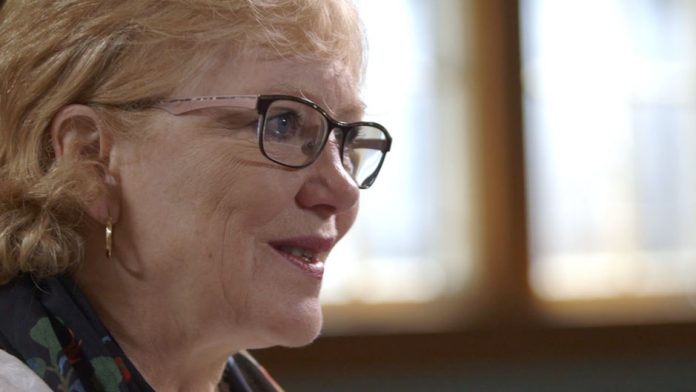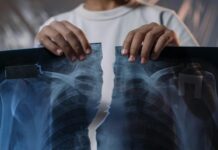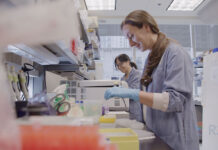Lori West is a Professor of Pediatrics, Surgery and Immunology at the University of Alberta, and Tier 1 Canada Research Chair in Cardiac Transplantation. We asked everything from why she chose her field of study to what’s on her playlist in hopes of giving you a better understanding of what goes on outside the lab for one of the best minds in Canadian research.
What inspired you to become a scientist?
I think I was always enthralled by science. Certainly from a very young age, according to my mother, I was happy to dissect frogs and chicken hearts, etc.
During university, I was initially most interested in field biology and ornithology. Field work in the rivers and swamps of rural Florida filled many wonderful months during my undergraduate years. I adored comparative animal anatomy and developed a special focus on monotremes of the Antipodes, the duckbill platypus being the quintessential bizarre combination of multiple anatomic elements in a single species.
Eventually, I became particularly engrossed in human physiology, which led me into medicine. But after medical school, and completion of my clinical training in pediatrics and pediatric cardiology, I was drawn back to more basic aspects of science in the field of transplant immunology.
What do you like most about being a scientist?
Wonder and curiosity drive scientific inquiry. The opportunity to work at the very interface of basic science and clinical medicine allows me to participate in both discovery science and in clinical application. This has been highly satisfying both intellectually and professionally.
What do you envision in the future of your field?
Transplantation science has always involved an amalgamation of individuals from various backgrounds, and has informed many other fields, such as autoimmunity, by its very nature. Although the idea of transplanting human ‘parts’ was described as long ago as medieval times, the first successful human organ transplant was not performed until Joe Murray transplanted kidneys between identical twins in the late 1950’s.
Surgeons, physicians, immunologists and many other types of scientists play key roles in transplant research, as well as members of multi-disciplinary clinical teams. Moreover, the moral, social, legal and ethical implications of donation and transplantation have always been an enthralling feature of this field, to the very extent of establishing new ways to define life and death. In the future, I believe these features will continue to move the field forward.
New methods to support and even repair donated organs outside the body prior to transplantation are already having a major impact on the field, involving close collaborations with biomedical engineers. These will have a special importance in a country with the geographical realities of Canada, allowing more ability to transport donated organs to and from distant sites. New aspects of regenerative medicine are bringing advances in ‘organ building’ closer to clinical reality.
Our understanding of favourable features of the very young immune system will allow us to exploit and harness the power of immune malleability to the benefit of our older patients as well. Interactions with nanotechnologists and other chemists are opening the doors to new tools to modify the immune system to allow more successful transplant outcomes.
How will your research make a difference in our lives?
Transplantation is truly a miracle of modern medicine. Our research will increase access to transplantation for people of all ages with end-stage organ failure, and will improve long-term outcomes of transplantation, leading to a return to productive lives.
What advice would you give young researchers?
Creative thinking and curiosity have been the main drivers of research forever. I would advise young researchers to continue to place great value on this, no matter what area of research they are considering. This will sustain their intellectual endeavours all their lives.
What do you consider your greatest achievement?
I would consider my greatest achievement the direct linking of a dramatic clinical need to a solution based on fundamental science, in the setting of some of our youngest and most vulnerable patients: infants dying of congenital heart disease in need of transplants. Helping to open a doorway to survival for these children has been immensely gratifying to me as a clinician, a scientist and a parent.
What do you read?
I read both fiction and non-fiction. I love British mysteries and spy stories; I am endlessly fascinated by the great deceptions of spies such as Kim Philby. I also find reading history, especially with regard to art and literature, very engaging. I’m always interested in reading authors who are highlighted on the ‘Canada Reads’ and Man-Booker prize lists.
What’s on your iPod?
At the urging of our teenage son, we recently bought a new turntable and are re-discovering vinyl! At a recent meeting in France, I had time to poke around a ‘broccante’ and found two Edith Piaf records from the early 60’s. I love ‘Fado’ music from Portugal; it has a haunting melancholy quality that intrigues me. I also have a certain fondness for old Broadway musicals, many of which, I must confess, I can still sing start to finish after learning them as a girl with my mother!
If you could meet any historical figure who would it be and why?
Well, who wouldn’t want to meet Leonardo da Vinci? What an incredibly interesting and diverse person he must have been, bringing together various these aspects of science and art as he did.
If you could do any profession other than your own what would it be?
Another profession that has always interested me is languages and linguistics, and the history of language evolution such as different dialects.
What do you like to do for fun?
The two activities that keep me reasonably sane during stressful times are playing the piano and riding my horse. Both require intense focus, which is helpful in distracting me from concentrating too much on work. However, these activities are completely dependent on being at home in Edmonton, thus suffer from my insane travel schedule.
For piano, I work on only one piece at a time, usually classical. I remain totally dependent on having the sheet music in front of me, so there’s little in the way of spontaneity in my playing. Nonetheless, small musical triumphs, such as becoming reasonably competent with a piece, are incredibly satisfying!
With riding, it’s lovely to be with these large warm animals, especially in the winter. The physical effort of working with a horse, learning to carry out various exercises together, correctly, is great fun. In the summer months, I love to work in the garden.
I also always wish I could find more time for wilderness excursions, taking me back to early activities in field biology.
When the occasion arises, I love to dance, and do so crazily and without regard to sensibility…











































